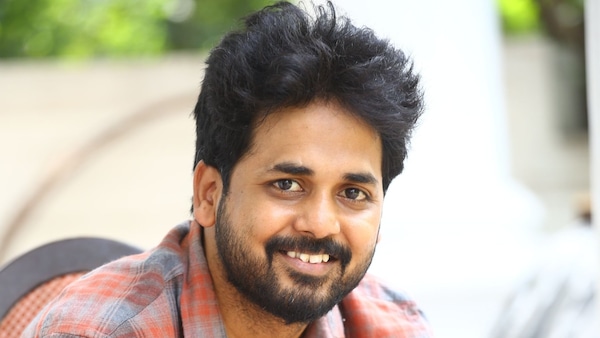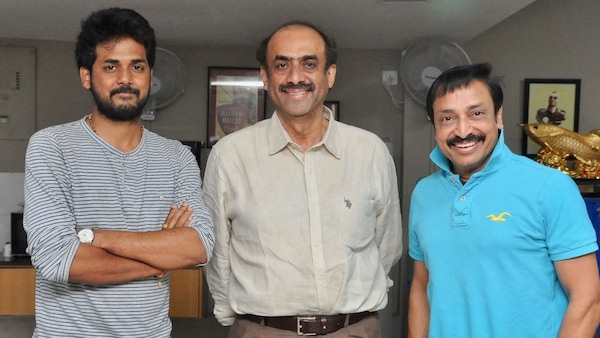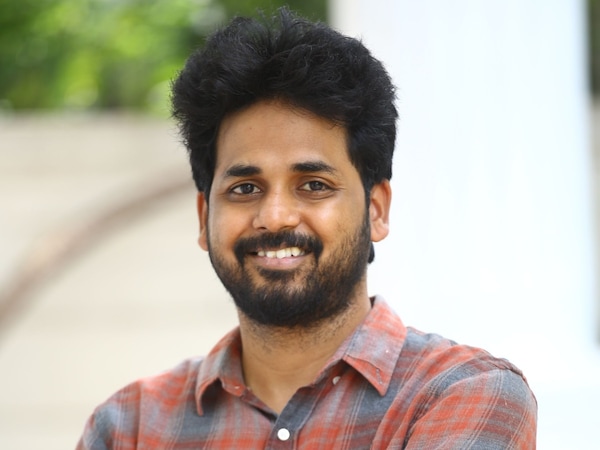Exclusive! Ante Sundaraniki director Vivek Athreya: Making someone smile without hurting anyone is a double-edged sword
The filmmaker spills the beans about the biggest film in his career, dealing with the success of Brochevarevarura and why he didn’t lose out on his originality despite working with a mainstream star like Nani

Last Updated: 01.19 AM, Jun 10, 2022
There are very few writers and directors in Telugu cinema like Vivek Athreya, who remain uncorrupted by the idea of success and trends and constantly remember their core identity while approaching their films. His films may not deal with pathbreaking themes but serve as a mirror to our own lives with a stroke of humour and satire.
If Mental Madhilo threw light on the complexities of long-distance relationships, Brochevarevarura packaged a sensitive story about sexual abuse in the garb of a thriller-comedy. His latest release, Ante Sundaraniki, which stars Nani and Nazriya Fahadh, is a lighthearted tale of an interfaith couple with another relatable issue at the core.
As he tries his luck at the box office with probably the biggest release of his career, Vivek Athreya, in a chat with OTTplay.com, offers a sneak-peek into his mind, his storytelling sensibilities, fears and of course Ante Sundaraniki, the story too.
Did your childhood play a key role in shaping your sensibilities as a storyteller?
The biggest influence in my life has been my childhood. I grew up watching movies with my parents, and sister and that’s how the film bug bit me. If I have a chance, I would still want to go back in time and return to my formative years. That’s the reason behind the nostalgia element in my stories; the filmmakers from the 80s and 90s shaped my idea of cinema.
Most of the sensibilities within my stories come from my surroundings. I don’t want to hurt anyone with whatever I try to tell. It’s difficult not to hurt people and pull off humour convincingly. Making someone smile without hurting anyone is a double-edged sword. I keep asking my team the same thing and I am doubly careful about it.
Hasn’t that become a big problem of late? The need to not offend anyone while you write?
It is indeed a problem these days. Whenever you write your first draft, these thoughts creep up subconsciously. That’s why with the first draft, I do my best to write it without any inhibitions or censors. Be it the way the characters talk, behave or use explicit words, I go all out with it. In the later versions, the script is anyway bound to be filtered and changed.
You debuted as a director in Telugu cinema at a time when slice-of-life cinema wasn’t in vogue. Was it difficult for you to convince producers to back your ideas then?
I think the producers are quite clear about what they would expect from me. With Mental Madhilo, the producer Raj Kandukuri had just backed Pelli Choopulu that was very much in the slice-of-life space and was in the right frame of mind to listen to my story. Our tastes matched. Brochevarevarura materialised because the producer happened to like Mental Madhilo.
Nani hasn’t done a slice-of-life drama in his career before Ante Sundaraniki - a film that has a family backdrop with situational humour and realistic characters. Even if he has hits like Nenu Local or Bhale Bhale Magadivoy, they were in the commercial, slapstick space. I think that’s what convinced Nani too and we too felt we could tap into his abilities better.

When you made Mental Madhilo and Brochevarevarura, you had nothing to lose and could afford to experiment. With Ante Sundaraniki, there’s a burden of the number game coming into play…
There’s pressure undoubtedly, no two things about it, even though I’m very confident about my content. The producers and Nani, who’ve watched the film, are quite sure about its potential at the box office. Even the CBFC board felt they were watching a film that they could take their families along.
I am the one tenser in my team. Having watched my film so many times, I have lost that objectivity and excitement to judge my film. Even if anyone watches my film, I try to understand the reaction by looking at their faces.
Despite pan-Indian successes like RRR or Pushpa, the Telugu industry, especially in the last few months, has failed to gauge what the audiences exactly want and the footfalls haven’t been too impressive either. What do you think is the issue here?
With the OTT boom over the last year and a half during the pandemic, we’ve gotten used to content of all kinds and audiences suddenly have a greater understanding of the craft from a global perspective. They have a bigger expectation while coming to the theatres but go back dissatisfied because they remember watching similar on OTT.
Audiences these days have a clear idea of where a story is headed and to engage them for two hours while keeping the predictability factor in mind has become a great challenge. It’s becoming increasingly difficult to meet their expectations.
When you say that the interfaith conflict isn’t the core issue in Ante Sundaraniki, are you using the Brahmin-Christian clash to add more familiarity and identifiability to the setup?
Familiarity is necessary for a story because a viewer shouldn’t feel alienated while watching a film. It’s important to tell a story they know, that is within the scope of their imagination and still surprises them. We can’t invent new stories every day and need to find our way within cinematic limitations. There’s nothing called an out-of-the-box story, the way you treat it makes all the difference. The way Ante Sundaraniki starts and ends will be a surprise. We don’t need to come up with new stories, we need to tell them in a way they embrace it wholeheartedly.

How did you deal with the success of Brochevarevarura..? A first commercial success is always special…
I am very awkward when dealing with compliments. Whenever someone doesn’t like what I do, there is a scope for discussion and to clear the air. When they tell me that they’re in awe of my work, there’s nothing else to add - the discussion ends there and I sheepishly say thank you and leave.
With the success of Brochevaraverura.., it was good to know that people liked my work, but all that adulation dilutes quickly. And with every film and a story, you need to start everything from scratch. When I know that three of my films belonged to three different genres, the worry about the box office result will be the same for every film. The pressures and the worries change with every film.
Do you look back at your films anytime?
I rarely watch my films. It’s three years since Broche.. released and I would’ve watched it three times at best. Whenever I watched it, I was embarrassed in many places and wondered why I shot a few scenes that way. You evolve as a filmmaker with time. I like Ante Sundaraniki now; maybe I’ll not be satisfied watching it six months later.
What was the biggest advantage of working with a production house as big as Mythri Movie Makers?
I don’t wish to blame anyone in particular but there are some limitations to a few stories and we’re told not to spend money on it beyond a certain figure. With Ante Sundaraniki, I had the liberty to be myself. Be it the resources or the people I wanted in the team, I got everything I wanted.
My producers Naveen Yerneni, Ravi Shankar and the executive producer firmly believed in my story and didn’t tinker with my vision at all. I had to be responsible to use that freedom, and budget and deliver a film they would be happy with. They loved what they saw.
In most cases, upcoming directors lose their identity and originality when they sign a star for their film. What exactly goes wrong in such cases? How have you avoided it with Ante Sundaraniki?
Star films come with an element of baggage and the director has the burden of fulfilling the expectations of the actor’s fans. For this script, Nani never asked me to do anything like that. When I narrated it to him, he liked the honesty in the story and the treatment.
Ante Sundaraniki won’t feel like a film dominated by a star. I can’t control what Nani’s fans may think but my duty was to do justice to Nani, the performer. Nani is among the best we have and he underplayed himself and surrendered to the script completely.
I preserve the originality in me because I write my stories going back to my native place, Guntur. I am at my best when I lock myself in a room there. When I write a story going back to my roots, I stick to my original instincts.
The fusion-dominated soundtrack is one of the main USPs of Ante Sundaraniki...
Right when I had written the story, I had the idea to bring an element of fusion into the soundtrack. We may have done fusion-based songs in our films before we haven’t done it quite authentically. Satire isn’t a common feature in our songs and we wanted to bring a veteran singer to croon for it.
I’ve been a great fan of Aruna Sairam for the longest time now. Right during my days in IBM, I used to listen to her version of Swagatham Krishna and other classical numbers. Even with Mental Madhilo, I was fascinated by Aruna Sairam’s rendition of Manavyalakincharadate.. for Agam and found a way to use the kirtana as a caption (and in one of the songs) in the film.
I wasn’t sure if Aruna garu would say yes to it but I loved her spirit when she said that she liked the vibe of the Panchakattu song and had a ball singing it. She is nearing her 70s and the child-like enthusiasm and the humility with which she lent her voice was a great learning curve for me. Her presence is one of the best things to have happened to Ante Sundaraniki.
The line to mock NRIs in the trailer about their discussions on snow and rains was a hoot!
I wanted to use the line to highlight Sundar’s desperation to go to the US. By hook or crook, he is eager to go there. People who know the place well will also know that it doesn’t snow in California - Sundar isn’t even aware of that and I wanted to bring his innocence out through that scene.
While you are familiar with Sundar’s Brahmin household in the film, was it an additional challenge to bring authenticity to the Christian backdrop for Leela’s character?
While I am familiar with the setup of Brahmin households, I am not very aware of the situation in Christian families, their rituals, beliefs system and sentiments. One of the biggest assets of the film is Niketh Bommi’s cinematography, Pallavi’s styling and Latha Naidu’s production design.
When I was discussing Sundar’s household of a middle-class family, I was telling Latha that it had to look cluttered, just like his mind. With Leela, I wanted the backdrop to be very simple and the house had to feel more spacious - it was an attempt to bring out the sophistication with which they lead their lives.
Latha researched a few Christian households and I was clear that Leela’s family belonged to the upper-middle class, which also had two young girls. I wanted her to use subtle, muted colours for the Christian household and achieve contrast with the louder colours in the Brahmin household. She gave me a lot of references and when I saw the sets, I was blown away.
When I brought my Christian friends to look at the set of Leela’s house, they felt it resembled their place. What greater compliment do I need? Getting Sundar’s house also was one of the best things that could’ve happened for the film. We no longer have houses like that and I could show their lifestyle as they hurriedly move from one room to the other.
How would you sum up Ante Sundaraniki in a nutshell?
Ante Sundaraniki will give you the experience of going back to your home. We have a jolly good time with one another on most occasions, feel low when things don’t go our way and still find a reason to stay together. No matter wherever you go, the satisfaction of returning to your home is unmatched - you’ll experience something similar in the film.
Subscribe to our newsletter for top content, delivered fast.

